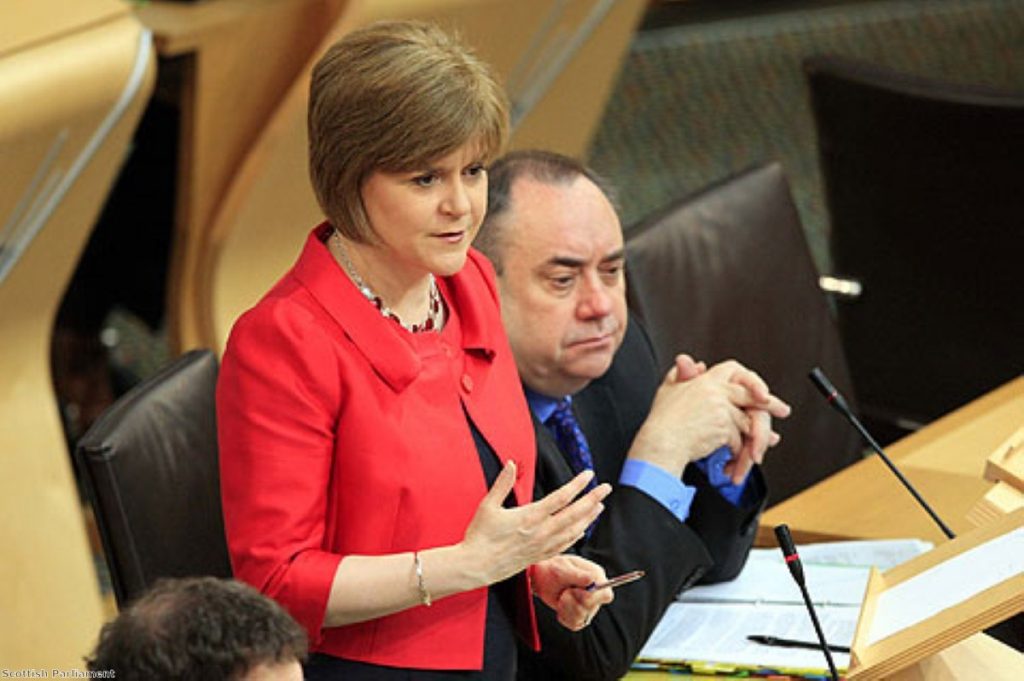At it again: Sturgeon’s EU veto call is a naked bid to federalise Britain
Nicola Sturgeon's call for a Scottish veto on Britain leaving Europe is underpinned by a radical agenda: to hijack the constitutional crisis triggered by the independence referendum and turn Britain into a federalised state.
It is the natural instinct of the Scottish National party (SNP) to push its luck. Alex Salmond asked voters to back independence, and won virtual independence on domestic matters instead. Now his successor as Scottish first minister is calling for Scotland's influence to extend to foreign affairs too.
Here's Sturgeon, as quoted in the Herald, on the possibility that Scotland could be forced to leave the EU if the UK voted for it:
"The impact of an exit on jobs and on the economy would be disastrous and to be taken out against our wishes would be democratically indefensible."
What she is proposing is a veto for each of Britain's four constituent parts – England, Scotland, Wales and Northern Ireland. Sturgeon claims this would transform the debate, "which so far has been all about the Westminster parties dancing to Ukip's tune". She continues:
"It would give us proper protection against any of the nations of the UK being removed from the EU against their will and it puts into practice what Westminster leaders told us was the case during the referendum campaign – that the UK is a family of nations, with each member of the family enjoying equal status."
Sturgeon's idea will no doubt be popular north of the border. But it could never work in principle. It is profoundly undemocratic. It allows a minority to dictate to the majority. It would create division and a sense of injustice.
Ultimately Britain – which probably won't vote to leave the EU, despite the current hysteria about the loose change of an unexpected two billion euro bill – is a sovereign state.
The same democracy which made the Scottish independence referendum decisive would apply in the event of a European exit. You can't have it one way and then the other.
A bagpiper has appeared to warm up the crowd. And George Square, which is now getting distinctly chilly, is loving it pic.twitter.com/zm9jE32Ahw
— Alex Stevenson (@Alex__Stevenson) September 19, 2014
Sturgeon's trump card is the idea that Britain is a 'family of nations' and that they are equal partners. They are – but some are more equal than others. They have to be, because Scotland has five million people and the rest of the UK 60 million. No single member of this family should be able to have a decisive say.
It's true that other countries do require unanimity. But they have a different set-up. In the US, an artificial country in the sense that the balance between state and federal powers could be finely balanced, the end result was a country with a weakened central power. That system does not apply in Britain.
Let's just get into the nuts and bolts of this. Britain's foreign policy is determined by the House of Commons and the government which can control it. If parliament did hand authority to the people, via the form of a legally binding referendum, then that people would speak. Not as four nations, but as one.
Sturgeon suggests a version of the double majority approach, as seen in some other countries with federal systems, would transform Britain. That is not the terms of the devolution deal. Whatever the end result of the constitutional debate which is now underway, London is not going to be giving up its powers on foreign affairs.
But the nationalists sense an opportunity to continue the momentum of their referendum campaign. Sturgeon is offering a new kind of push-your-luck nationalism, defiant in defeat and implacable over devolution. It will galvanise support for the SNP. But it should be taken seriously only when accepted for what it is: an attempt to secure a new kind of federalism in Britain.

Europe: So much simpler without the borders














